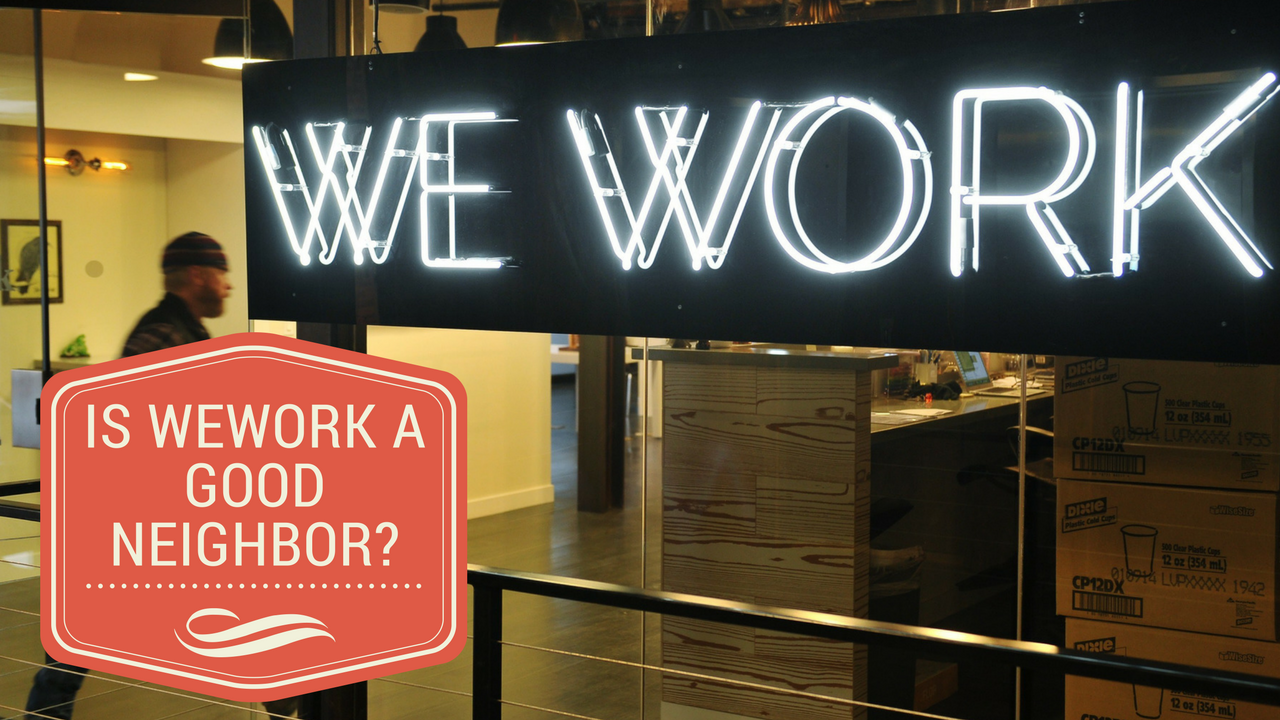- As WeWork continues to grow, there are both positive and negative implications for the flexible workspace industry
- In terms of marketing, WeWork makes the most noise and other operators benefit from some of the echo
- However, the workspace giant has also been criticised for questionable tactics such as client poaching and price-dumping
In January this year, Deskmag published an article titled “WeWork harms 40% of all coworking spaces in its close vicinity, however…”. The article presents statistics from the Global Coworking Survey, which gathers data both from coworking and flexible workspace operators, as well as its users.
According to Deskmag, “half of all coworking spaces worldwide think that their economic perspectives are unaffected by WeWork. A fifth reported positive influences and a tenth reported negative influences.” Nonetheless, the survey also found that “every third coworking space views WeWork as a threat to its economic perspectives; however this opinion depends on the concrete vicinity to WeWork locations.
“Overall, the vast majority of the coworking spaces that report positive influences through WeWork are those that aren’t located in the direct vicinity to WeWork locations, but also not too far away.”
All of the above led us to ask the question: is WeWork a good neighbor, or not?
The short answer is yes and no.
WeWork’s valuation has for a long time been a topic of debate in the industry, and though many believe it’s not warranted, there is no denying that the coworking giant is well backed. These funds have been used for expansion, for acquisition, and for marketing. If we focus on the latter (marketing), we can argue that WeWork is indeed a good neighbor.
WeWork spends a significant percent of its budget in marketing efforts; efforts that have helped educate the world about coworking. Whether operators want to admit it or not, WeWork has helped power the industry by telling the world all about themselves and what they offer. And though many, including WeWork, argue that they aren’t really a coworking brand, they do advertise as one, and they bring to light the benefits of the flexible workspace industry.
In Jamie Hodari’s, co-founder and CEO of Industrious, words:
“To gain a shared office customer, you need to educate them about the benefits of working in a shared setting; then you need to convince them that you’re their best option among the shared office operators. The former of these (educating people about the benefits of shared workspace) is the more labor intensive, time intensive, and expensive part. So as WeWork grows (and gets more funding), they are out there doing a lot of the visibility and education work for the industry as a whole, which has a really salutary effect on demand in general.”
Looking at it from this perspective, while WeWork makes the most noise, other operators get some of the echo, which is why, as Deskmag states, those that aren’t too close but neither too far from WeWork locations are the ones that perceive WeWork as a positive influence.
WeWork’s marketing efforts reach these individuals that are looking for space. And while they won’t always meet their needs in terms of location or other requirements, there are other smaller, independent operators nearby that do.
So for them, WeWork is a good neighbor.
On the other hand, if you have a coworking space in the direct vicinity of WeWork or in a relatively untapped market, their marketing efforts might do you more harm than good, as we saw last year when WeWork employees started to reach out to other workspace members in the hopes of getting them to sign a lease with WeWork.
Further reading on this topic:
Not only did those marketing efforts include reaching out to workspace members, it also meant price dumping. This not only made the offer attractive for those seeking to tighten their budget, but it also undervalued the rest of the industry in the area.
In cases like these, WeWork is a bad neighbor.
Not only because they can take away some members, but because if the operator is not able to recover, it might force them to close their doors. In May of last year, Work Better closed its 1440 Broadway location after it had been running for 10 years. This particular Work Better location had 4 WeWork locations less than a mile away.
In an interview last year, Jamie Hodari, co-founder and CEO of Industrious, stated that “In the future, it’s almost inevitable that there will be a WeWork in striking distance from most operators. Those workspace operators that have strong products, loyal customers, and top services will be fine; but the ones that can’t or don’t will eventually find themselves in a lot of trouble.”
So while WeWork is a good neighbor to some and a bad neighbor to others, the focus shouldn’t be on them. It should be on the services and amenities you offer, on whether you are able to bring something unique and valuable to your members. As the industry grows, so does competition, which is why coworking operators need to focus on their value proposition and building a strong community.



 Dr. Gleb Tsipursky – The Office Whisperer
Dr. Gleb Tsipursky – The Office Whisperer Nirit Cohen – WorkFutures
Nirit Cohen – WorkFutures Angela Howard – Culture Expert
Angela Howard – Culture Expert Drew Jones – Design & Innovation
Drew Jones – Design & Innovation Jonathan Price – CRE & Flex Expert
Jonathan Price – CRE & Flex Expert












